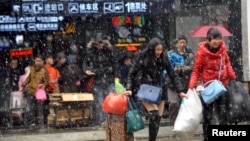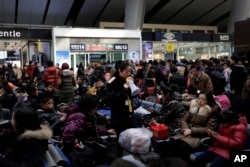Tens of thousands of people in Shanghai joined the world's largest annual human migration on Monday to make their way home for family reunions to celebrate the Lunar New Year.
At Shanghai's main railway station, crowds of people dragging luggage rushed to catch trains that will take them back home to welcome the Year of the Monkey, which begins on February 8.
The 40-day travel frenzy surrounding the week-long Lunar New Year holiday began on January 24, and will last till March 3, with an estimated total volume of passengers reaching more than 2.91 billion, up by 3.6 percent year-on-year, said the National Development and Reform Commission (NDRC), China's top economic planner.
Billions of trips
There would be about 2.48 billion trips by road, 332 million railway journeys, 54.55 million trips by air and 42.8 million by water during this period, the NDRC added.
Lou Xianzhen, 28, a migrant worker who has been working in Shanghai for six years, said he was eager to see his family during this special time.
"(I) miss (my) wife and child. (I) went back home last October, and wanted to return home for these days," said Lou.
According to China Railway Corporation, the operator of China's rail network, it plans to run 3,488 pairs of trains during the 40 days, an increase of 14.5 percent from 2015.
It seems to make no difference for ordinary people traveling for the New Year celebrations also know as the Spring Festival, as many said they had made plans to get tickets after New Year's eve.
Weak economy
Data from China's statistics bureau last month showed growth for 2015 was 6.9 percent, its weakest pace in a quarter of a century, capping a tumultuous year that witnessed a huge outflow of capital, a slide in the currency and a summer stocks crash.
Some migrant workers working in big cities complained that they could hardly get a job in 2015 and going back home might be a choice for the new year survival.
"Go back home for job search. Find a job this year in (my) hometown. If fail, (I) will come back to have a look, and my husband is still there, my husband with children are there. In fact we have been in Shanghai for more than a decade," said 48-year-old migrant worker Dai Shanrong.
Chinese celebrate the New Year by eating a huge meal with loved ones and letting off fireworks in the streets.






